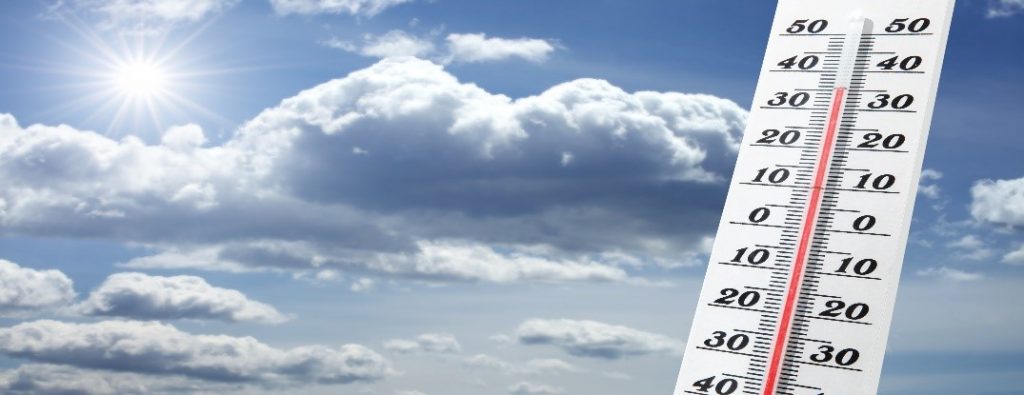22 Aug Beat the Summer Heat!
Hot Weather Safety for Seniors

Hot weather can increase everyone’s risk for heat exhaustion and dehydration, but it’s especially dangerous for seniors, who may not be as aware of changes in body temperature. The body’s ability to cool itself diminishes with age, and conditions that can cause heat cramps in a teen may lead to heat exhaustion in a 40-year-old and heat stroke in someone over 60.
Fortunately, keeping older adults safe and healthy during hotter weather is manageable when you follow these simple tips:
Turn on the AC
Setting an air conditioner to 78°F is the best way to avoid heat-related illness, but not all city apartments are air-conditioned, and air conditioners may break down or not perform well during extreme temperatures. If your loved one doesn’t own an air conditioner, open windows and use fans, but pull shades as low as possible to keep out the sun and leave fans running at night to draw in cool air.
It’s very important to make sure air-conditioner filters are changed or cleaned frequently. Filters can trap allergens such as pollutants, mold spores, pollen, and dust. When the unit is turned on, these particles are blown through the air and can cause breathing problems.
Pay Attention to the Air Quality Index
Recent research indicates that it isn’t just the high temperatures that make heat waves so dangerous. Higher temperatures often go hand in hand with higher levels of air pollution. Smog, ozone, and even smoke from forest fires can make it difficult to breathe and may increase the risk of heart attack and stroke. Listen to local news and weather channels during heat waves for updates on health and safety. Weather apps and forecasts often track air quality index, so you can take steps to limit outdoor activities that may cause breathing problems.
Stay Hydrated
One of the most important ways to stay safe and healthy during the summer is by staying hydrated. Have plenty of liquids on hand, but if your family member has heart, kidney, or liver disease, check with their physician about how much is safe. In addition to drinking water, eat foods containing water, such as fruits, vegetables, gelatin (Jell-O), and ice pops. Avoid coffee and alcohol, which can deplete, rather than replenish, fluids.
Remember to Eat
Though your appetite may decrease in summer months, it is important to continue to eat well during hot weather. Be sure your daily meals contain protein (lean meats, like chicken and fish) and complex carbohydrates (vegetables and whole grains). Eat small, frequent meals to keep up your strength.
Enjoy Cooling Baths and Showers
Take frequent lukewarm (not cold) baths and showers to keep your body temperature from rising too high. Be sure that the bathtub has a slip-resistant mat or safety bars to prevent slips and falls.
Hiring a Caregiver or Companion
Hiring a home health aide can provide peace of mind for family members, and regular home visits offer welcome companionship when extremely hot weather keeps you inside for long periods of time. At the very least, be sure to have a neighbor or friend check in on a loved one periodically to make sure they are okay. Illness from heat can cause a person to become confused or even lose consciousness. Check on loved ones and neighbors who are over age 65 at least twice a day (and if you’re over 65, ask a friend or relative to call you twice a day).
Stay Inside at Midday
The hottest time of the day is between 10 AM and 2 PM. Avoid cooking or spending time outdoors during this period. If you must leave the house during a heat wave, wear loose, light-colored clothing and a wide-brimmed hat. Don’t forget sunscreen, especially if you take medications that increase sensitivity to sunlight. Always keep a fresh bottle of water in the refrigerator and bring it with you when you go out.
Practice Car Safety
Don’t let anyone stay in a car while it is parked without air-conditioning. Cars can heat up to dangerous temperatures very quickly and anyone left in a car is at risk for serious heat-related illness or even death.
Seek out Cool Places
Visit your local library, shopping center, movie theater, community center, or anyplace with air conditioning. When the heat index is dangerously high, New York City opens cooling centers. Tip: Libraries, senior centers, and community centers often serve as cooling centers during heat waves.
Watch for signs of heat-related illness:
–Leg or stomach cramps are often the first sign. Treat mild cramps immediately with rest and fluids; if cramps are severe or accompanied by nausea, seek medical attention.
–Fatigue, weakness, nausea, headache, dizziness, confusion, weak or rapid pulse, and shallow breathing are signs of heat exhaustion and heat stroke. With heat exhaustion, the skin is clammy or sweaty, and with heat stroke it is flushed, hot, and dry.
–Treat heat exhaustion by elevating feet, placing cool wet cloths on the skin, and giving the person water or electrolyte solutions. If these don’t help, seek medical attention. Heat exhaustion can develop into heat stroke, which is a medical emergency. Call 911 at once!

No Comments